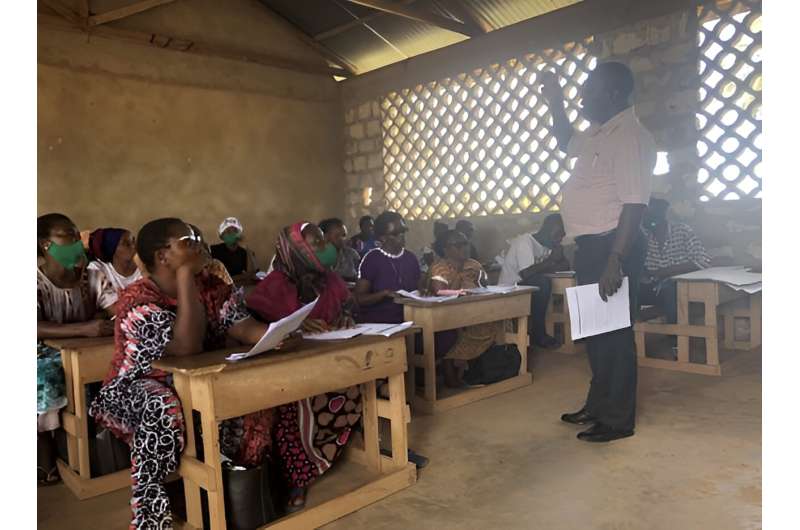This article has been reviewed according to Science X's editorial process and policies. Editors have highlighted the following attributes while ensuring the content's credibility:
fact-checked
trusted source
proofread
Aging study in Kenya to help sub-Saharan Africa navigate major shifts in its population

The population of Africa is the youngest in the world—but that is expected to change rapidly in the coming decades.
Over the next three decades, the proportion of older Africans will triple across the continent. This population will nearly quadruple in Kenya, one of the most rapidly aging countries in Sub-Saharan Africa. And yet demographers report that robust longitudinal data to address the economic and health-related consequences of this demographic transition are largely missing.
The Longitudinal Study of Health and Ageing in Kenya (LOSHAK), a study that will eventually enroll thousands of participants and follow them over time, has been designed to address this gap. A collaboration between the University of Michigan and Aga Khan University in Nairobi, the study will build out nationally representative datasets on key determinants of health and economic well-being among older Kenyan adults.
That data will enable evidence-based public policy, public health and economic responses to the challenges associated with population aging in Sub-Saharan Africa.
"We have an opportunity to elucidate key issues such as trajectories of mid- to late life health risks and diseases, dementia, disability, the role of environmental pollution and climate change, and the factors that influence late-life economic well-being," said Anthony Ngugi, associate professor of epidemiology and population health at Aga Khan University, and a principal investigator of LOSHAK.
LOSHAK will advance population aging research in low- and middle-income countries while accounting for conditions that are regionally specific. Three-quarters of older Kenyans, for example, live in rural areas, where access to health care, environmental exposures, social ties and climate vulnerability differ from those in more urban settings. While many live in multigenerational households, a growing number of older Kenyans live alone.
The large young population in Sub-Saharan Africa has led to national health priorities that have historically been centered around the health needs of children and working-age adults. LOSHAK will also have unique, innovative data relevant to Kenya, such as the impacts of cash transfers on economic security and health, molecular biomarkers, and physiologic measures, according to U-M researcher Niranjani Nagarajan of the Department of Ophthalmology and Visual Sciences.
LOSHAK in its feasibility phase
"LOSHAK is the inaugural study in Kenya to gather longitudinal data on the health, psychosocial, economic and environmental aspects of individuals," said Nagarajan, who was lead author of a recent publication in Innovation in Aging describing LOSHAK's current feasibility and pilot phase activities that will be used to build toward the full population-representative study.
Modeled on the Health and Retirement Study at the U-M Institute for Social Research, LOSHAK joins a network of harmonized studies on aging in more than 45 countries worldwide with data that are publicly available to researchers. LOSHAK will be only the second such study in Sub-Saharan Africa.
The feasibility and pilot phase of LOSHAK is validating measures and data collection procedures in a purposive sample of Kenyan adults 45 and older. In a partnership that leverages local expertise, infrastructure and leadership, this phase is nested within the Kaloleni/Rabai Community Health and Demographic Surveillance System, run by Aga Khan University on the coast of Kenya.
Key issues include disability, climate change
"This study has been designed to build the necessary infrastructure to collect data that will promote optimal health and economic well-being in Sub-Saharan Africa," said Josh Ehrlich, research assistant professor at the Survey Research Center at the Institute for Social Research, assistant professor of ophthalmology and visual sciences at Michigan Medicine, and a principal investigator on the project.
The LOSHAK study presents new ways and opportunities to apply population-level data to the study of the impact of climate change on adult health.
"The aging population in Africa faces particular susceptibility to the causes of climate change, such as air pollution, as well as its associated effects, including heat waves, drought and flooding," Nagarajan said.
In its feasibility phase, the LOSHAK team has used air pollution monitors worn by participants to gather data about household and neighborhood environments previously unavailable in Kenya. Transitioning to a national-level study, the team aims to collect comprehensive air pollution data for both individuals and their living environments.
"We intend to link this data to household fuel use, issues related to climate vulnerability, and concerns about food and water security," Nagarajan said. "These robust longitudinal air pollution datasets hold the potential to identify individuals at heightened risk of morbidity and mortality resulting from climate change."
Shane Burns, a medical sociologist and a postdoctoral fellow at the Population Studies Center at the Institute for Social Research, has a special interest in disability in the understudied Global South and is working with the LOSHAK team.
"As someone who regularly uses the HRS international family of studies in their research, working with LOSHAK is extremely rewarding," he said. "People often age into disability, which can be a range of physical, sensory or cognitive limitations. So, I'm thrilled to apply my expertise in disability and global aging to LOSHAK so that it includes a comprehensive profile of disability measures."
More information: Niranjani Nagarajan et al, Development of the Longitudinal Study of Health and Ageing in Kenya (LOSHAK), Innovation in Aging (2023). DOI: 10.1093/geroni/igad111





















